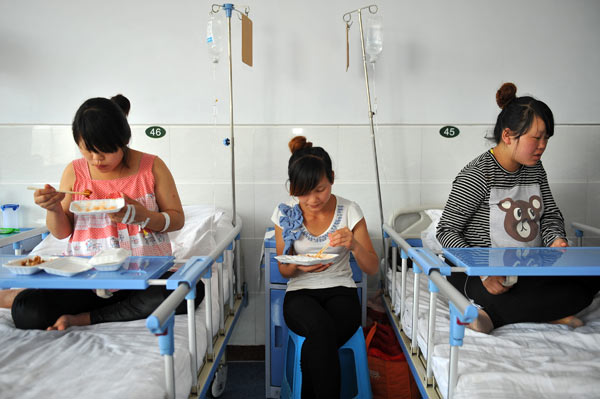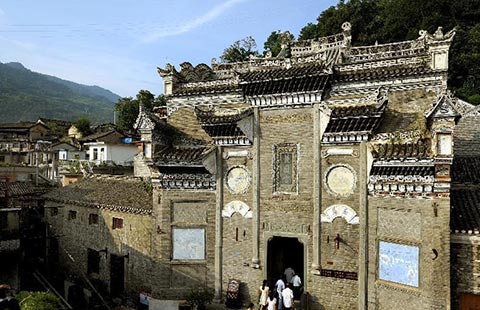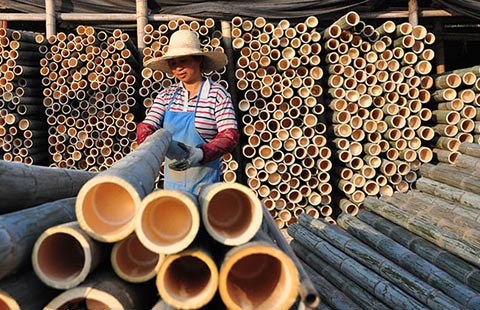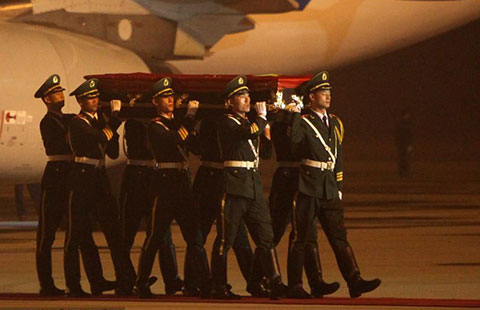Reform to relieve people of worries about medical bills
Updated: 2015-08-04 08:09
(China Daily)
|
||||||||
 |
|
Pregnant women eat lunch at a county hospital in Fugu county, Shaanxi province. Basic medical insurance covered more than 95 percent of the Chinese population in 2011, forming the largest basic medical insurance network in the world. [Photo/Xinhua] |
The national plan to extend medical insurance to cover all critical illnesses for urban and rural residents who are part of the basic urban medical insurance and rural cooperative medical program will hopefully prevent households from going bankrupt because of the high costs of treatment for serious diseases.
The State Council document announcing the plan, which was issued on Sunday, says 50 percent of the medical costs for critical illnesses will be covered by insurance.
Some may wonder whether residents will have to pay extra premiums to benefit from the change. But the answer is no, because the government will use part of the medical insurance people have paid to buy insurance from companies to cover the costs of treatment.
In Guangzhou, South China's Guangdong province, where such a system was introduced in September, a patient suffering from a critical illness, such as cancer, or one in need of a major surgery, can have his or her medical costs reimbursed by 50 percent after paying the required basic expenses. If the costs are very high, the amount above the stipulated ceiling can be reimbursed by up to 70 percent.
From 2013, residents in Shenzhen, also in South China's Guangdong province, have been getting up to 80 percent of the cost of treatment for critical illnesses from their medical insurance. The percentage has now increased to 90 percent.
Under the rural cooperative medical program, critical illnesses used to consist of only 22 types of diseases, including congenital heart disease and leukemia. But the new plan makes it clear that higher than normal medical costs is the only criterion for the reimbursement of medical bills for serious illnesses. The standard varies in different provinces at present.
The document released by the State Council, or Cabinet, encourages local governments to work out their own plans to ensure poor families get a higher percentage of their medical costs covered by insurance in order to prevent high medicals bills from pushing them into penury.
Although the possibility of high medical bills denting the purses of households with a patient of serious illnesses cannot be totally ruled out, rolling out of the change to the healthcare insurance system nationwide is aimed at relieving residents of their worries about hefty medical costs for the treatment of critical illnesses.
The State Council is winning people's heart by passing the benefits of reform to the people.
- Remains of Chinese guard killed in Somalia attack return home
- Gala promotes gender equality
- Trafficked woman appeals to be left alone, continue her life
- Wreckage discovery shouldn't disrupt search: MH370 families
- 3,000 students attend pre-exam session in huge hall
- 38.7b yuan in State assets recovered in campaign

 Flying Tigers show in New York
Flying Tigers show in New York
 Kobe Bryant frenzy grips Guangzhou
Kobe Bryant frenzy grips Guangzhou
 Three generations keep traditional lion dance alive
Three generations keep traditional lion dance alive
 Shuhe ancient town in NW China's Shaanxi
Shuhe ancient town in NW China's Shaanxi
 Top 10 regions with highest GDP growth
Top 10 regions with highest GDP growth
 Remains of Chinese guard killed in Somalia attack return home
Remains of Chinese guard killed in Somalia attack return home
 Top 10 international destinations for Chinese millionaires
Top 10 international destinations for Chinese millionaires
 Rainstorm affects 940,000 in South China
Rainstorm affects 940,000 in South China
Most Viewed
Editor's Picks

|

|

|

|

|

|
Today's Top News
Malaysia seeks help to widen search for MH370
Obama issues challenge on climate change with power plant rule
China role crucial in UN plan
Biden associates resume discussion about presidential run
Rule covers HIV as work hazard
Professor accused of spying out on bond
Chinese defense concerned about US moves in South China Sea
Remains of Chinese guard killed in Somalia attack return home
US Weekly

|

|







